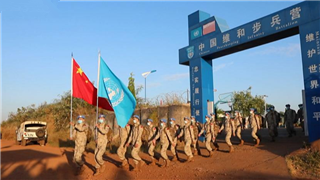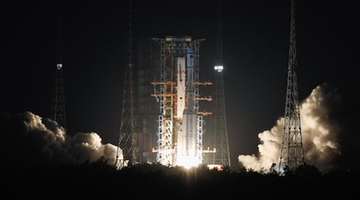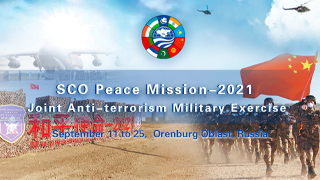愤怒,或许是欧盟2021年在外交领域最深刻的感受之一。在让欧盟感到愤怒的对象中,就有其所谓的“盟友”——美国。监听欧洲盟友、不打招呼就从阿富汗撤军、背弃法国抢到澳大利亚核潜艇合同……美国的种种行径让欧盟愈发意识到自身战略自主能力的不足。那么,欧盟的战略自主能够真正实现吗?
Anger may be what the EU has felt most in the diplomatic arena over the past year, and one of the reasons for that is the US, its so-called ally. What the US has done in the past year, from tapping the leaders of European allies to pulling troops out of Afghanistan without prior notice to stealing Australia’s nuclear submarine contract from France, has increasingly made the EU realize its lack of strategic independence. But can it become strategically independent?
战略自主成“优先议题”
Strategic independence as a “priority”
今年8月底,在塔利班通牒下,美国甩下欧洲盟友从阿富汗仓促撤军。随后,美英又与澳大利亚建立“三边安全伙伴关系”,支持其建造核潜艇,后者随即中止了与法国签订的核潜艇购买合同。
The US left its European allies and pulled back from Afghanistan at the end of August this year under the Taliban’s ultimatum. Later it and the UK formed a “trilateral security partnership” with Australia and helped the latter build nuclear submarines, prompting Canberra to call off its nuclear submarine contract with France.
北京外国语大学国际关系学院教授王朔指出,成立快反部队一直是欧盟的待办事项,但因缺乏动力迟迟没有进展。此次美国从阿富汗撤军,再次暴露出拜登政府的“美式利己主义”,极大刺激了欧盟加快落实战略自主具体措施。
According to Professor Wang Shuo at the School of International Relations and Diplomacy, Beijing Foreign Studies University, the EU has been planning to form a rapid reaction force for a long time, but still hasn’t taken any substantial action because of the lack of motivation. America’s pullback from Afghanistan once again exposed Biden administration’s “American-style self-centrism” and stimulated the EU to take accelerated actions toward strategic independence.
中国社会科学院欧洲研究所副所长田德文认为,在英国脱欧和新冠疫情的双重冲击下,欧盟引以为傲的“全球影响力”有所下降,而美国战略重心转向印太态势愈发明显,使欧洲在军事上陷入离不开美国却又靠不住美国的两难境地。欧盟正面临着从地缘政治意义上消失的风险。因此,为继续在国际舞台上发挥独特的“领导作用”,欧盟亟须实现战略自主。
Tian Dewen, deputy director of the Institute of European Studies of the Chinese Academy of Social Sciences, held that the dual shocks from Brexit and COVID-19 have taken a toll on the EU’s global influence that it used to pride itself on. At this moment, the US is obviously shifting its strategic focus to the Indo-Pacific, putting Europe in such a dilemma that it has to rely on the US for military security but cannot totally count on it. Threatened by the risk of geopolitical oblivion, the EU is pressured to realize strategic independence as soon as possible to continue playing a unique “leading role” on the international stage.
欧盟内部“众口难调”
A consensus is hard to reach within the EU
“欧盟只是一个主权国家联合体,在安全与防务政策方面没有独立的权能,各成员国在安全防务方面也存在很大差异,导致欧盟战略自主在具体内容和进展上众口难调。” 田德文指出。
“The EU is just a union of sovereign states that has no independent authority in security and defense policies, on which point the member states vary greatly. Therefore, it’s hard to reach a consensus within the union on the contents and progress of strategic independence,” said Tian Dewen.
田德文分析说,作为欧洲一体化“发动机”的法国和德国,在战略自主问题上存在较大分歧。相较于法国,德国因为历史原因,并不希望欧盟的战略自主与北约集体防务产生矛盾。此外,中东欧国家和一些北欧国家,在安全上更相信美国军事保护的承诺。
He analyzed that France and Germany, the two engines of European integration, have wide divergences on the topic. Germany, for historical reasons, doesn’t hope to see the EU’s strategic independence contradict NATO’s collective defense. Besides, Central and Eastern European countries and some Nordic countries are more trustful of America’s commitment to security and military protection.
王朔也认为,虽然欧盟对战略自主的整体意愿在上升,但是其多元特质决定了成员国各自的能力、需求以及战略目标都不可能一样,这种差异是欧盟战略自主需要面对的首要问题。面对欧盟成员国发展速度不一、利益分歧严重的情况,欧盟提出了简化决策程序、打造“多速欧洲”的设想,但这也让不少中东欧国家担忧自己会沦为欧盟内部的“二等公民”。
Wang held that although EU as a whole has a stronger wish for strategic independence, it’s only natural that the multiple member states vary from each other in capability, demand and strategic goals – such differences are what EU needs to smooth out first if it is to achieve strategic independence. Considering the uneven development speed and serious divergences on the distribution of interests among member states, the EU has proposed to streamline the decision-making procedures and allow for a Europe of various tracks. However, that makes many Central and Eastern European countries worry that they may be reduced to the second class within the Union.
前行需要“理念转型”
“Change of mindset” required to realize strategic independence
影响欧盟实现战略自主的诸多因素中,美国的态度至关重要。“美国需要一个有一定行动能力、能发挥盟友作用的欧洲,而不是一个完全独立、无法掌控的欧洲。”王朔指出,近年来,大国竞争已经成为美国的优先战略方向,其不会放任欧盟去发展战略自主,又不愿向欧洲增加军事投入,还不想放弃在欧洲防务的主导权。因此,美国更多地利用欧盟的内部矛盾来敲打、分化欧盟,影响甚至控制欧盟推动战略自主和防务一体化的节奏。
America’s attitude is vital among all the factors that may hinder the EU’s progress toward strategic independence. “What the US needs is a Europe that is capable of taking actions as an ally, but not one that’s totally independent and uncontrollable,” said Wang Shuo. Major-country competition has become America’s strategic priority in recent years. However, it will neither give free rein for the EU to foster strategic independence, nor make more military investment in Europe, or give up its dominance over Europe’s defense. Under such circumstances, the US will make use of the Union’s internal conflict to divide it and consequently influence or even control the tempo of its efforts toward strategic independence and defense integration.
田德文表示,欧盟战略自主是一个过程,目前的进展还只是量的积累,要实现质的变化需要其逐渐摆脱“冷战思维”,恪守自己作为超国家行为体的定位,即维护欧洲和平与繁荣而非与他国对抗,只有完成这种战略理念上的转型,欧盟战略自主未来才可能取得突破性进展。
Tian explained that strategic independence is a process for the EU. What it’s doing now is just quantitative accumulation. To achieve a qualitative change, it has to abandon the Cold-War mindset and stick to its position and function as a supra-national entity – to safeguard peace and prosperity in Europe rather than seek confrontation with other countries. Only when it changes its strategic mindset will it be possible to make breakthroughs on its way toward strategic independence.










